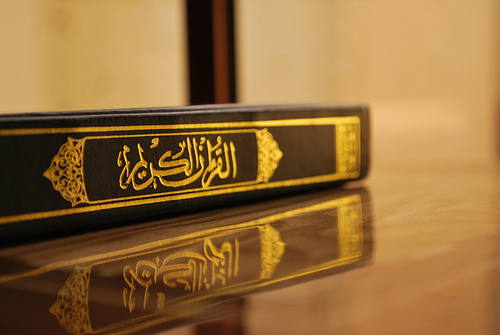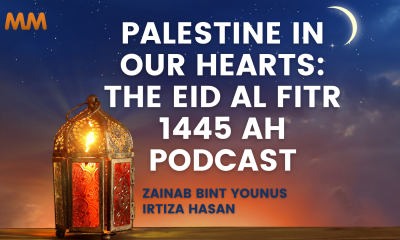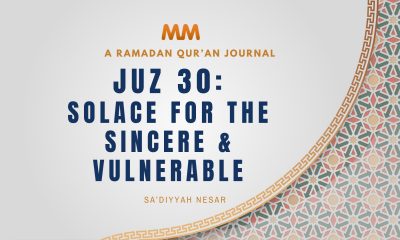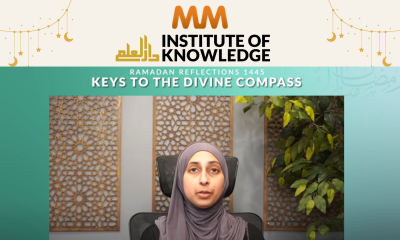For all parts, up to and including this one, click “Ramadan Reflections: The Daily Journey“
Ramadan Reflections Juz 5
Keep supporting MuslimMatters for the sake of Allah
Alhamdulillah, we're at over 850 supporters. Help us get to 900 supporters this month. All it takes is a small gift from a reader like you to keep us going, for just $2 / month.
The Prophet (SAW) has taught us the best of deeds are those that done consistently, even if they are small.
Click here to support MuslimMatters with a monthly donation of $2 per month. Set it and collect blessings from Allah (swt) for the khayr you're supporting without thinking about it.
Juz 5 – Surat an-Nisaa’
The Right of the Neighbor
وَاعْبُدُواْ اللّهَ وَلاَ تُشْرِكُواْ بِهِ شَيْئًا وَبِالْوَالِدَيْنِ إِحْسَانًا وَبِذِي الْقُرْبَى
وَالْيَتَامَى وَالْمَسَاكِينِ وَالْجَارِ ذِي الْقُرْبَى وَالْجَارِ الْجُنُبِ
Worship Allah and join none with Him in worship, and treat with excellence your parents, kinsfolk, orphans, Al-Masaakin (the poor), the neighbor who is near of kin, the neighbor who is a stranger …. [4:36]
`Ali bin Abi Talhah said that Ibn `Abbas said that, “the neighbor who is near of kin” means, “The neighbor who is also a relative”, while, “The neighbor who is a stranger” means, “Who is not a relative.”
There are a great number of ahadith that command the kind treatment of the neighbor as well as the tremendous virtue of this deed. It is sad though that this deed has been so neglected in recent times. I ask you in all honesty, how many of us know the names of our neighbors? For the majority of people living in the West, their neighbors are not Muslims and we have no relationship with them beyond a wave and hello from time to time. How will we fare on the Day when we meet Allah when we have neglected to inform the closest of people to us – at least in proximity – about the message of Allah?
To help us to return to this noble practice and this illustration of the excellence of Islamic manners, let us now take a look at some of the ahadith that praise and command this deed:
`Abdullah ibn `Amr (ra) had a sheep slaughtered. He repeatedly asked his servant, “Have you sent some meat [as a present] to our Jewish neighbor?” When he said that, he added, “I heard Allah’s Messenger (saas) say, ‘Jibreel has repeatedly recommended me to be good to my neighbor to the extent that I thought that he would include him [my neighbor] among my heirs‘ ” (Ahmad and At-Tirmidhi with a similar narration from Ibn ‘Umar in Bukhari and Muslim).
And `A’ishah (ra) asked the Messenger of Allah, “I have two neighbors, so whom among them should I give my gift” He said, “The neighbor whose door is the closest to you.” (Bukhari)
And Abu Hurairah (ra) relates that Allah’s Messenger (saas) said: “Whoever believes in Allah and the Last Day should speak a good word or remain silent. And whoever believes in Allah and the Last Day should show hospitality to his neighbor. And whoever believes in Allah and the Last Day should show hospitality to his guest.” (Agreed)
So how can we be good to our neighbor then? So many Muslims are so shy and afraid of being rejected or criticized for their deen, but alhamdulillah there are a number of ways to prep the ground for a solid relationship with the neighbor:
-
The next time you go shopping for food, buy an extra few of a certain item and give it as a gift to your neighbors. I have done this in the past with cakes and when my neighbors looked at me with surprise, I told them that my religion enjoins the good treatment and good relations with the neighbor and that I thought of them when I bought this. I have solidified many a good neighborly relation through such small gifts alhamdulillah and so can you. Furthermore, there is support for this type of deed in the authentic hadith of Abu Dharr which states: “If you cook something with gravy, increase the gravy and send some of it to your neighbors” (Agreed)
-
For those that have homes, trim your neighbor’s grass when you do yours – with their permission of course. This is a noble act that someone did for me once and I never forget it and always felt in their debt for this simple act of kindness and consideration.
-
Be considerate of your neighbors when you have guests by not making noise and even by inviting them if you are having a get together. There is no better way for them to see the goodness and beauty of Islam than through an invitation where they can get to know you better and get to know other Muslims. Even for those who are despondent and negative towards your efforts, your good manners and care not to annoy them will break down even the highest barriers insha’Allah. Remember the warning of RasulAllah (saas) where he said, “He will not enter paradise, the one whose neighbor is not safe of him.” (Muslim)
The next ayah I wished to mention, if even briefly as it doesn’t not require much of explanation but should be a strong and potent motivator for us to learn the Sunnah of our beloved Messenger and to follow it, is the following ayah:
وَمَن يُطِعِ اللّهَ وَالرَّسُولَ فَأُوْلَـئِكَ مَعَ الَّذِينَ أَنْعَمَ اللّهُ عَلَيْهِم
مِّنَ النَّبِيِّينَ وَالصِّدِّيقِينَ وَالشُّهَدَاء وَالصَّالِحِينَ وَحَسُنَ أُولَـئِكَ رَفِيقًا
And whosoever obeys Allah and the Messenger (saas), then they will be in the company of those on whom Allah has bestowed His Grace; of the Prophets, the Siddiqûn (those followers of the Prophets who were first and foremost to believe in them, like Abu Bakr As-Siddiq), the martyrs, and the righteous. And how excellent these companions are! [4:69]
`Amr bin Murrah Al-Juhani said, “A man came to the Prophet (saas) and said, `O Allah’s Messenger! I bear witness that there is nothing worthy of worship except Allah and that you are the Messenger of Allah, pray the five (daily prayers), give the Zakah due on my wealth and fast the month of Ramadan.’ The Messenger of Allah said, “Whoever dies in this state will be with the Prophets, the truthful and martyrs on the Day of Resurrection, as long as – and he raised his finger – he is not disobedient to his parents.” (Sahih)
This hadith occurred before the Hajj was made an obligation and for this reason was not mentioned, and Allah knows best.
Also Anas reported, “A man asked the Prophet (saas) about the Hour (Day of Judgment) saying, ‘When will the Hour be?’ The Prophet (saas) said, ‘What have you prepared for it?’ The man said, ‘I have not prepared for it much of (involuntary) prayer and fasting, except that I love Allah and His Messenger.’ The Prophet said, ‘You will be with those whom you love.’ We had never been so happy as we were on hearing that saying of the Prophet (‘You will be with those whom you love.’) Therefore, I love the Prophet, Abu Bakr and ‘Umar, and I hope that I will be with them because of my love for them though my deeds are not similar to theirs. (Bukhari)
A brief explanatory note on this last hadith is helpful as it has been misunderstood by many; the statement of this Companion, “I have not prepared for it much of prayer and fasting …” refers only to the involuntary. He was not a person who was missing any of the obligatory prayers or fasting, but he was comparing himself to the noble Companions who stayed up in the night so long to pray and fasted so often. Compared to them it was as if he did nothing because his involuntary acts were so limited. Thus, his completion of the obligatory and his desire to increase the involuntary could qualify him as one who loved Allah and His Messenger and thus the Prophet (saas) did not reject his statement and said he would be among those he loved, and we ask that Allah also include us in this excellent and noble company in Jannah by His mercy and His limitless bounty – ameen!
And Allah knows best.











Naila
September 9, 2008 at 9:37 PM
Assalamu alaikum,
JazakAllah khair for this post. May Allah (SWT) reward you for your efforts.